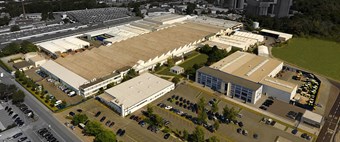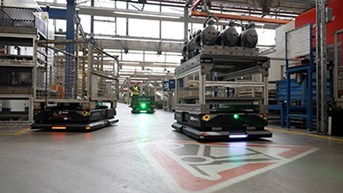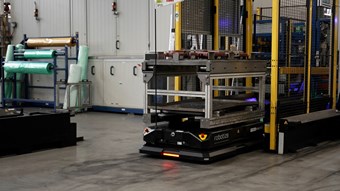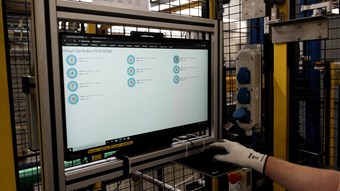The GoPal® solution
at CLAAS
- Customer: CLAAS Industrietechnik GmbH
- Location: Paderborn, Germany
- Employees: 600+
- Industries: Agricultural Technology, Municipal Equipment, Construction Machinery
- Robotize Partner: mR MOBILE ROBOTS
- Transportation of goods within a challenging production environment
- GoPal E24 AMRs
- 150+ Pallet Stations (incl. integration with a central parts washing system)
- GoControl integration to third party systems to automatically open doors/gates, automatically activate warning lights and integration to camera for sorting pallet cages
- GoPal AMRs safely and efficiently navigating busy, narrow lanes with mixed human/machine traffic on uneven production floors
- Reclaiming valuable factory space to increase employee productivity and ensure tidy workstations
- Freeing up employees for more valuable tasks than manually transporting goods
- Short lead time from customer feature request to implementation in GoControl software
The Customer
CLAAS Industrietechnik in Paderborn, Germany is a subsidiary of the renowned international agricultural machinery manufacturer CLAAS. With more than 600 employees, CLAAS Industrietechnik has been developing and producing a wide range of drive technology and hydraulic systems for CLAAS machines and external customers since 1957.

As a "company-within-the-company", CLAAS Industrietechnik is responsible for producing important components such as axles, transmissions, corn crackers as well as hydraulic and electrical components. One particularly innovative product range is the continuously variable transmission variants developed in-house for CLAAS tractors and the TERRA TRAC crawler tracks for CLAAS combine harvesters and forage harvesters.
To provide their employees with the best possible support in their tasks for the various assemblies, CLAAS has always focused on suitable technological solutions in production. The result: A well-known, consistently high CLAAS product quality.
 GoPal E24s transporting goods 24/7/365 at CLAAS Industrietechnik.
GoPal E24s transporting goods 24/7/365 at CLAAS Industrietechnik.
(Watch full video).
The Challenge
In 2020, our German partner, mR MOBILE ROBOTS, was commissioned to deploy a test installation of the GoPal solution at the Paderborn production facility. The goal was to increase efficiency by automating the internal transport of goods.
Starting with a single GoPal E24 and four pallet stations, the initial goal was to find out whether the robot could operate smoothly given the challenging environmental conditions in the production hall. These challenges included an uneven floor, navigating narrow lanes in a busy, mixed human/forklift traffic environment, metal chips on the floor as well as oily air from the processing machines.
As approx. 70 per cent of all transports, which are special goods carriers, such as pallet cages, initially lead from the individual processing centers to a centralized parts washing system, a major logistical challenge was to ensure traffic management for an efficient and smooth workflow as well as error-free processing of the autonomous jobs. As a precondition for this, some details had to be given special consideration, such as ensuring that the transport containers were correctly aligned for handling.
The Solution
After the two-month test run, CLAAS was so satisfied with the results that the company decided to scale their GoPal solution to the current total of six GoPal E24 AMRs and more than 150 pallet stations, including stations at several machining centers and at the central parts washing system. When the robot arrives at the central parts washing system, the goods are automatically removed and fed into the washing system.
 A GoPal E24 delivering goods to be washed in the central parts washing system.
A GoPal E24 delivering goods to be washed in the central parts washing system.
(Watch full video)
After washing, the parts are removed and placed into mesh boxes. Once these are full, the robots then transport the boxes to the warehouse. As it is very important that these mesh boxes are correctly positioned, the boxes are analyzed by a camera communicating with the AMRs (via GoControl) to detect whether the boxes are empty/full and correctly aligned. Depending on their status, the mesh boxes are then automatically sorted and reintroduced into the process cycle.
In addition to these central processes, the GoPal solution has also automated the removal of chips as well as the repositioning of empty waste containers at the processing stations.
The Benefits
Over the years, the production facility at Paderborn had grown in terms of processes but had become “cramped” in terms of space. By deploying the GoPal solution, it was possible to significantly increase operational efficiency - without major changes to existing processes, by removing loaded pallet cages and goods carriers. Before automation, parts often remained in the production hall until the next processing step. After automation, there is now space available for productive activities at workstations, which now remain tidy and the workflow for employees has also been significantly improved.
Being inherently collaborative robots (“cobots”), the GoPal AMRs can safely work among humans, forklifts etc. Using its laser scanners and proximity sensors, the robots automatically adjust their speed according to the situation, such as slowing down when passing through restrictions or approaching people, forklifts, or other obstacles.
If something is blocking its path, the GoPal AMR automatically stops, calculates a new route to its destination, circumnavigates the obstacle and continues on its way to complete its job.
Virtual Buttons enable CLAAS employees to manually create a GoPal job by simply pressing a button at their workstation, thereby creating an order for either collection or delivery – depending on programming.
 Virtual Buttons enable employees to manually call a GoPal AMR for collection/delivery.
Virtual Buttons enable employees to manually call a GoPal AMR for collection/delivery.
(Watch full video)
The GoPal solution at CLAAS also contains I/O Boxes for communicating with 3rd party systems. This way, the GoPal AMRs can communicate with devices within the production environment to, for example, automatically open gates/doors or trigger visual signals, such as warning or information signals.
About CLAAS Industrietechnik
CLAAS Industrietechnik - a 100% subsidiary of the CLAAS Group - provides innovative solutions in drive technology and hydraulics. The company generates revenue of more than €200 million and employ a workforce of around 650 at their location in Paderborn. From the initial idea to series production, the company develops and produces system solutions within agricultural technology, municipal equipment, and construction machinery.
Robotize Partner on this project![]()
To read the Case Study in German or to learn more about our German partner, please visit www.mobile-robots.de


